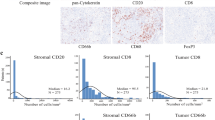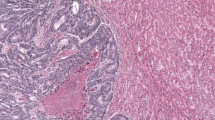Abstract
Local immunoregulation mediated by mononuclear tumour-infiltrating cells is considered of importance for tumour progression of colorectal cancer, although the balance between immunosuppressor and cytotoxic activities is unclear. Colorectal cancers from 26 patients were investigated using a panel of monoclonal antibodies in order to identify subsets of mononuclear inflammatory cells and to study their pattern of distribution in relation to tumour stage and cytotoxic immune reactivity against the tumour. In all but five tumours, mononuclear cells, lymphocytes or monocytes were present in fairly large numbers, particularly in the stroma. The infiltration of CD4+ mononuclear cells predominated over the CD8+ subset. Infiltration near the tumour cells was found in four cancers only. Stromal infiltration of CD11c+ macrophages was found in all but eight tumours. Small regressive areas, in which the histological architecture of the tumours was broken down, were found in 17 tumours with intense or moderate infiltration by CD4+ lymphocytes or CD11c+ macrophages. Probably this destruction of tumour tissue was caused by cytotoxic activity of the tumour-infiltrating mononuclear cells. In Dukes' class A and B tumours, CD4+ lymphocytes predominated over CD4+ cells with macrophage morphology, but the latter were increasingly found in Dukes' class C and D disease. The occurrence of MHC II-positive macrophages and lymphocytes in different Dukes' classes was similar to that of CD4+ cells. In contrast to this, CD11c+ and CD11a+ cells were more frequent in Dukes' A and B class tumours compared with Dukes' C and D. Four out of nine tumours of the latter stages showed a poor inflammatory reaction. The interpretation of our results is that the subsets of tumour-infiltrating mononuclear cells change with advancing Dukes' class and that the local immune control is gradually broken down in progressive tumour growth, even if some cytotoxic activity is still present.
This is a preview of subscription content, access via your institution
Access options
Subscribe to this journal
Receive 24 print issues and online access
$259.00 per year
only $10.79 per issue
Buy this article
- Purchase on Springer Link
- Instant access to full article PDF
Prices may be subject to local taxes which are calculated during checkout
Similar content being viewed by others
Author information
Authors and Affiliations
Rights and permissions
About this article
Cite this article
Håkansson, L., Adell, G., Boeryd, B. et al. Infiltration of mononuclear inflammatory cells into primary colorectal carcinomas: an immunohistological analysis. Br J Cancer 75, 374–380 (1997). https://doi.org/10.1038/bjc.1997.61
Issue Date:
DOI: https://doi.org/10.1038/bjc.1997.61
This article is cited by
-
Contribution of resident and recruited macrophages to the photodynamic intervention of colorectal tumor microenvironment
Tumor Biology (2016)
-
Macrophages stimulate gastric and colorectal cancer invasion through EGFR Y1086, c-Src, Erk1/2 and Akt phosphorylation and smallGTPase activity
Oncogene (2014)
-
Macrophage expression of tartrate-resistant acid phosphatase as a prognostic indicator in colon cancer
Histochemistry and Cell Biology (2014)
-
Comparative effects of gamma and microwave irradiation on anticarcinogenic effect of red chili in colon and liver of male albino rats
Comparative Clinical Pathology (2013)
-
The density of macrophages in colorectal cancer is inversely correlated to TGF-β1 expression and patients’ survival
Journal of Molecular Histology (2013)



